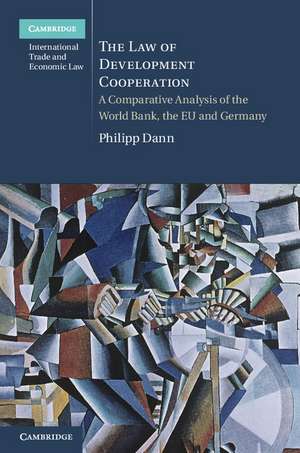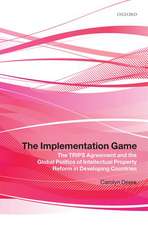The Law of Development Cooperation: A Comparative Analysis of the World Bank, the EU and Germany: Cambridge International Trade and Economic Law, cartea 11
Autor Philipp Dann Traducere de Andrew Hammelde Limba Germană Hardback – 6 noi 2013
Din seria Cambridge International Trade and Economic Law
-
 Preț: 177.62 lei
Preț: 177.62 lei -
 Preț: 271.22 lei
Preț: 271.22 lei -
 Preț: 284.39 lei
Preț: 284.39 lei - 23%
 Preț: 692.51 lei
Preț: 692.51 lei -
 Preț: 177.47 lei
Preț: 177.47 lei - 14%
 Preț: 699.45 lei
Preț: 699.45 lei -
 Preț: 216.93 lei
Preț: 216.93 lei - 14%
 Preț: 698.61 lei
Preț: 698.61 lei -
 Preț: 321.52 lei
Preț: 321.52 lei -
 Preț: 272.97 lei
Preț: 272.97 lei -
 Preț: 323.05 lei
Preț: 323.05 lei - 14%
 Preț: 868.71 lei
Preț: 868.71 lei -
 Preț: 292.88 lei
Preț: 292.88 lei -
 Preț: 288.42 lei
Preț: 288.42 lei - 23%
 Preț: 641.51 lei
Preț: 641.51 lei -
 Preț: 178.30 lei
Preț: 178.30 lei -
 Preț: 432.05 lei
Preț: 432.05 lei -
 Preț: 320.17 lei
Preț: 320.17 lei - 23%
 Preț: 753.36 lei
Preț: 753.36 lei - 11%
 Preț: 636.34 lei
Preț: 636.34 lei - 23%
 Preț: 616.00 lei
Preț: 616.00 lei - 14%
 Preț: 703.74 lei
Preț: 703.74 lei -
 Preț: 285.37 lei
Preț: 285.37 lei - 14%
 Preț: 699.45 lei
Preț: 699.45 lei - 14%
 Preț: 786.62 lei
Preț: 786.62 lei -
 Preț: 314.83 lei
Preț: 314.83 lei - 14%
 Preț: 895.68 lei
Preț: 895.68 lei - 14%
 Preț: 1015.31 lei
Preț: 1015.31 lei - 14%
 Preț: 896.85 lei
Preț: 896.85 lei -
 Preț: 405.20 lei
Preț: 405.20 lei -
 Preț: 322.51 lei
Preț: 322.51 lei - 14%
 Preț: 727.26 lei
Preț: 727.26 lei -
 Preț: 283.79 lei
Preț: 283.79 lei - 14%
 Preț: 727.59 lei
Preț: 727.59 lei - 14%
 Preț: 785.48 lei
Preț: 785.48 lei
Preț: 708.14 lei
Preț vechi: 823.42 lei
-14% Nou
Puncte Express: 1062
Preț estimativ în valută:
135.52€ • 140.96$ • 111.88£
135.52€ • 140.96$ • 111.88£
Carte tipărită la comandă
Livrare economică 14-28 aprilie
Preluare comenzi: 021 569.72.76
Specificații
ISBN-13: 9781107020290
ISBN-10: 1107020298
Pagini: 604
Dimensiuni: 155 x 235 x 35 mm
Greutate: 0.95 kg
Ediția:New.
Editura: Cambridge University Press
Colecția Cambridge University Press
Seria Cambridge International Trade and Economic Law
Locul publicării:New York, United States
ISBN-10: 1107020298
Pagini: 604
Dimensiuni: 155 x 235 x 35 mm
Greutate: 0.95 kg
Ediția:New.
Editura: Cambridge University Press
Colecția Cambridge University Press
Seria Cambridge International Trade and Economic Law
Locul publicării:New York, United States
Cuprins
Introduction; Part I. Institutional and Intellectual History of Development Co-operation: 1. Formative years; 2. Years of transformation; Part II. Constitutional Foundations of the Law of Development Co-operation: 3. Institutions and legal framework; 4. Principles of the law of development co-operation; Part III. Administrative Law of Development Co-operation: 5. Programming the transfer of ODA; 6. Transferring ODA through project aid; 7. Transferring ODA through budget support; 8. Transferring ODA through results-based financing; 9. Accountability in ODA transfers; Conclusions and future prospects.
Recenzii
'The Law of Development Cooperation can justly be celebrated as the 'state of art' of legal reasoning. Every single page of the book is stimulating and full of insights valuable to both development practitioners and legal scholars alike. On the conceptual level, the construction of a multi-layered legal field of development cooperation from an institutional perspective that focuses on the legal norms of donors seems highly plausible. It presents academics with a rich yet workable area for further research.' Giedre Jokubauskaite, European Journal of International Law
Descriere
This comparative study of rules governing development assistance asks how accountability, human rights and sovereignty are preserved while combating poverty.










